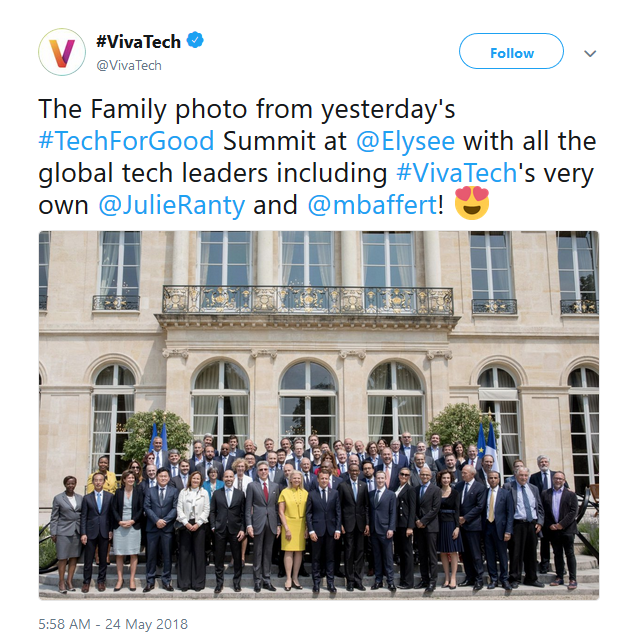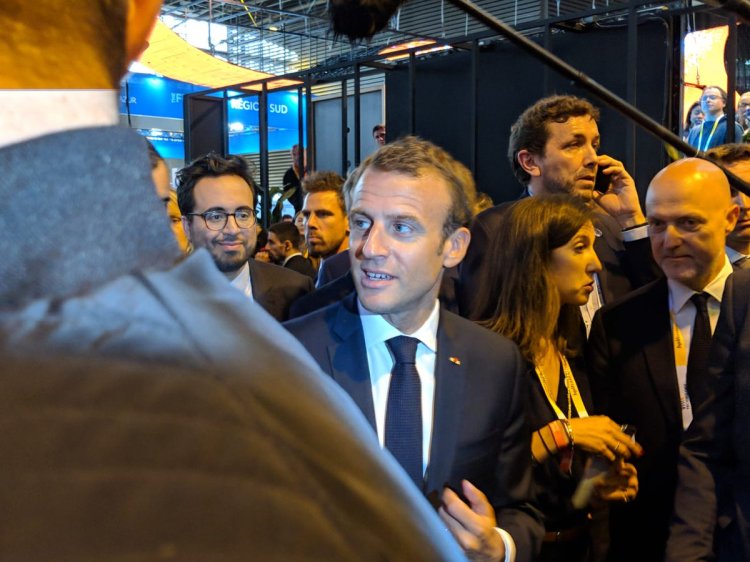Watch all the Transform 2020 sessions on-demand here.
In a kind of digital call to arms, French president Emmanuel Macron sought to position his country as a beacon for a disruptive future — reconciling the desire to encourage innovation with the need to address the social chaos it could cause.
“We are in the middle of a signficant revolution,” Macron said. “I believe profoundly in this revolution. But there is a growing fear of change. And there is fear because many people worry they will not be included. And there is fear because the leaders of this change don’t recognize their impact, and they don’t respect regulations. And that creates defiance.”
Macron delivered his remarks in an hour-long keynote at the Viva Technology conference in Paris. The previous day, at his “Tech For Good” summit, he hosted a number of tech CEOs who followed up with announcements of steps their respective companies would take and programs they would launch to target changes in education, health care, and research into how best to adapt to a changing world.
“We have the responsibility that the technology we build benefits everyone,” Microsoft CEO Satya Nadella said today during his introduction of Macron. “We must be responsible guardians of progress. We need to ask ourselves not only what computers can do, but what computers should do.”
June 5th: The AI Audit in NYC
Join us next week in NYC to engage with top executive leaders, delving into strategies for auditing AI models to ensure fairness, optimal performance, and ethical compliance across diverse organizations. Secure your attendance for this exclusive invite-only event.
 Macron also used his talk to trumpet the advances of the French Tech ecosystem, including its steady growth in venture capital raised, the opening of Station F, and a number of reforms he has put in place to support entrepreneurs in France. As the former Minister of the Economy, Macron was an active cheerleader for French startups, and after his election one year ago he declared his goal for France to become a “Startup Nation.”
Macron also used his talk to trumpet the advances of the French Tech ecosystem, including its steady growth in venture capital raised, the opening of Station F, and a number of reforms he has put in place to support entrepreneurs in France. As the former Minister of the Economy, Macron was an active cheerleader for French startups, and after his election one year ago he declared his goal for France to become a “Startup Nation.”
But more directly, Macron has begun to map out something that falls between policy and a branding exercise. In an effort to attract overseas tech companies and encourage venture capitalist to invest in France, he has begun to position the country as taking a more ethical approach to developing technologies.
In this keynote, for instance, he criticized the lax regulatory environment in the U.S., saying government has a responsibility to explain how it’s protecting and helping its people through times of economic disruption.
“You have a U.S. model, and the U.S. is not regulated,” he said. “It was driven and it is driven by private players. It was very good for innovation at the beginning. But this model is being jeopardized and will have trouble because it’s up to government to explain to its people how it functions …The U.S. model is not sustainable because there is no political accountability.”
By the same measure, he warned that China is in a strong position to triumph in critical markets like artificial intelligence thanks to the overt role government takes in setting policy and investment priorities. But the risk if Chinese companies win is that they will impose user rules that create even more surveillance of private data and limits on speech.
“On the other side, you have a very stong model in China,” Macron said. “But it doesn’t have the same values for human rights, respect for everyone, and gender equality. But I’m sorry, I don’t want my people being regulated under Chinese laws. I don’t want them dominated by this Chinese centralization.”
Macron continued: “How to reconcile a model for the common good — that’s the challenge of our generation.”
For Macron, that means investments by these companies in reinventing education systems, including life-long job training. More directly, it means that big companies must also pay their fair share of taxes. While trying to lure these tech giants to come to France, he made it clear that it’s not fair for local entrepreneurs to pay full taxes while big companies find ways to dodge them. And he reiterated his support for a European tax on huge tech companies, saying it is the best way to ensure a level playing field while also giving governments the resources they needed to invest in social programs.
“I am a strong supporter of the European tax for big players,” he said. “It’s fair, and it’s sustainable. You have to participate in the change that is affecting society.”


